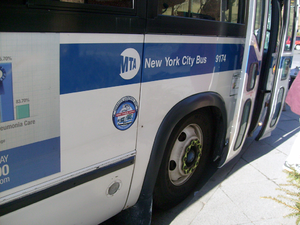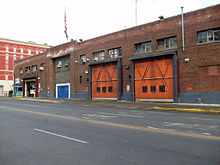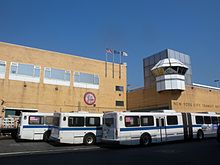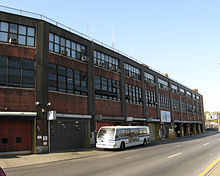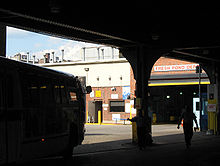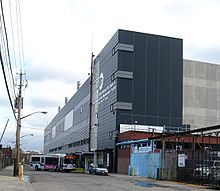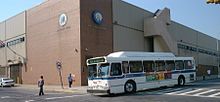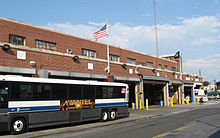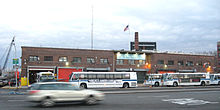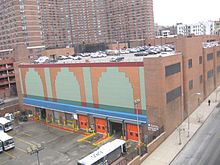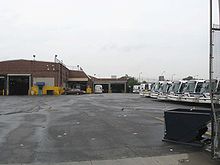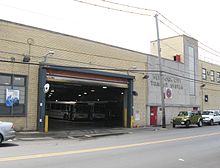- Bus depots of the New York City Transit Authority
-
The New York City Transit Authority (NYCTA) and its subsidiary, the Manhattan and Bronx Surface Transit Operating Authority (MaBSTOA), operates local and express buses out of a number of bus depots in all five boroughs of New York City, United States. Some of these depots were once car barns for streetcars, while others were built later and have only served buses.
Contents
Central Maintenance Facilities
New York City Transit Authority has two major central maintenance facilities that serves in the New York City area. The Grand Avenue Central Maintenance Facility is located adjacent to the Grand Avenue Depot in Maspeth and the Zerega Avenue Central Maintenance Facility is located at 750 Zerega Avenue in the Bronx. Both maintenance facilities are responsible for major reconstruction of buses needed to repair with various work shop, motor repair, engine rebuild, transmission shop and body component area on New York City Transit Authority's bus fleet and surface transportation training/institutional facility. Zerega Avenue is responsible for registry of new buses in the fleet. [1]
Bronx Division
Amsterdam Depot
The Amsterdam Depot was located in the block bounded by Amsterdam Avenue, Convent Avenue, and 128th and 129th Streets in Manhattanville, Manhattan. The MTA shut down the Amsterdam Depot's bus operations on September 7, 2003, the day the new 100th Street Depot opened. The depot was part of the Manhattan Division until spring 1998, when it was transferred to the Bronx Division due to the opening of the Michael J. Quill Depot and the closure of the Walnut Depot.[2] The depot was once a Third Avenue Railway car barn.[3] On January 6, 2008, MTA reopened the depot temporarily because of a rehabilitation project at the Mother Clara Hale Depot. Amsterdam Depot's closed on June 27, 2010 for the service cuts, M1 & M7 was transferred to Manhattanvillie Depot, while the M98 went to Quill. This garage now houses the museum bus fleet.
Gun Hill Depot
The Gun Hill Depot is located at 1910 Bartow Avenue [16], just west of the New England Thruway in Baychester, Bronx. It opened on September 10, 1989, and was the first NYCTA depot to use solar panels, which now provide about 40% of the depot's power.[4] Gun Hill Depot is also the only New York City Transit bus garage to be built on previously undeveloped land. Currently the Bx12 Select Bus Service is dispached from this depot.
Kingsbridge Depot
The Kingsbridge Depot is located in the block bounded by Ninth Avenue, Tenth Avenue, and 216th and 218th Streets in Inwood, Manhattan. Two blocks to the south is the New York City Subway's 207th Street Yard. The depot was originally a car barn, and became the location of the central repair shop in 1947, when the 65th Street Shops closed. In 1948, the shop was again relocated to the depot in Yonkers.[3] The original 1897 depot stood until 1990.[citation needed] Today, Kingsbridge Depot consists of two separate buildings; one for maintenance and one for bus storage.
Mother Clara Hale Depot
The site of the Mother Clara Hale Depot, formerly named the 146th Street Depot until 1993 [5], fills the block bounded by Lenox Avenue, Seventh Avenue, and 146th and 147th Streets in Harlem, Manhattan. The depot is named for Harlem humanitarian Clara Hale.
The site of the depot was initially home to the Lenox Avenue Car House, a car barn and power station, built by the Metropolitan Street Railway for their Lenox Avenue Line, the first line in the city to use conduit electrification. The line and depot began service on July 9, 1895.[6] The New York City Omnibus Corporation, which had replaced the former trolley lines with bus routes in 1936, began constructing a new bus garage on the site in 1938.[7] Operations from the new depot began on July 31, 1939.[8]
The previous depot building closed in January 2008 and was demolished in spring 2009. A new garage is being built on the site, scheduled for completion by 2012.[9] To make up for a lost depot, the Amsterdam Depot reopened temporarily, with some routes shifted to Manhattanville and West Farms.
For the former Oscar City Railway car barn on Walton Avenue,[3] see West Farms Depot (Oscar City Railway).West Farms Depot
The West Farms Depot is located along East 177th Street and next to a terminated Sheridan Expressway in Tremont, Bronx. Opened on September 7, 2003 on the site of the former Coliseum Depot .[4]
Brooklyn Division
East New York Depot
The East New York Depot is located at One Jamaica Avenue [17] at Bushwick Avenue in East New York, Brooklyn, just east of the New York City Subway's East New York Yard. The depot opened in 1859 as a car barn for the Broadway Railroad's Broadway Line.[citation needed]
Flatbush Depot
For the former car barn on Flatbush Avenue in Flatbush, see Vernon Avenue Depot.The Flatbush Depot is located in Flatlands, Brooklyn, near the Kings Plaza shopping center, where a number of bus routes terminate. The depot occupies two blocks, bounded by Fillmore Avenue, East 49th Street, Avenue N, and Utica Avenue.
The Brooklyn Heights Railroad (part of the Brooklyn Rapid Transit Company) opened the depot in mid-1902 along its Flatbush Avenue Line (later the Bergen Beach Shuttle) on Avenue N.[10][11][12] The depot, designed by architect D. R. Collin of the BRT, was intended to be the first of a new system-wide design, but few of the company's depots, mostly inherited from former streetcar operators, were rebuilt to match.[13] It eventually served a number of lines from the Flatbush area, including the Bergen Beach Shuttle, Flatbush Avenue Line, Nostrand Avenue Line, Ocean Avenue Line, and Utica Avenue Line.[citation needed]
Fresh Pond Depot
The Fresh Pond Depot is located on the east side of Fresh Pond Road south of Madison Street in Ridgewood, Queens, and lies just west of the Fresh Pond Yard of the New York City Subway.
Grand Avenue Depot
The Grand Avenue Depot is located between 47th Street and 49th Place on the north side of Grand Avenue in Maspeth, Queens. The building is on the former site of a car rental business. This modern 600,000 square feet (56,000 m2) and environmentally friendly facility is the first of its kind for New York City Transit Authority. It opened on January 6, 2008. [14] [15] The building design is certified Environmental Management Systems ISO 14001 specifications.[16]
The four-story building includes four fueling and defueling stations, cleaning and storage facilities for 200 buses on the first floor, an advanced 27 bus central maintenance facility on the second floor, administrative offices for NYCT's Department of Buses on the third floor, and parking garages for MTA employees on the roof. The central maintenance facility will be able to repair and maintain the newer fleet of diesel, diesel hybrid-electric, 60-foot (18 m) articulated, express coach and compressed natural gas buses and expand the capabilities of the current East New York central maintenance facility for Brooklyn and Queens. The facility also has four environmentally friendly paint booths - self-contained units that avoid the spread of contaminants. [17][18]
The building meets the needs of expanding demands of relieving the overcrowding Brooklyn Division's buses and upgrading the Department of Buses' facilities to be state-of-the-art from both environmental and technological standpoints.[19]
Jackie Gleason Depot
The Jackie Gleason Depot, formerly the Fifth Avenue Depot until June 30, 1988,[20] is located on the east side of Fifth Avenue between 36th and 39th Streets in Sunset Park, Brooklyn. Named after Jackie Gleason, who grew up in Brooklyn and played bus driver Ralph Kramden in The Honeymooners, it is just west of the 36th-38th Street Yard of the New York City Subway. The depot was equipped with a compressed natural gas fueling station on June 7, 1999, the first NYCTA depot to support CNG buses. This and the West Farms Depot are the only depots to use CNG buses in the city.[4] CNG testing began in 1990, when the NYCTA was testing Transportation Manufacturing Corporation RTS-06 CNG demonstration model buses.[citation needed]
Ulmer Park Depot
The Ulmer Park Depot is located at 2449 Harway Avenue in the neighborhood of Bensonhurst, Brooklyn. The depot fills the block bounded by 25th Avenue, Bay 38th Street, Harway Avenue, and Bath Avenue. It was opened for operation in 1950 and is a single story, 118,800-square-foot (11,040 m2) building. [21]
Manhattan Division
100th Street Depot
The 100th Street Depot is located at 1552 Lexington Avenue [22], filling the block bounded by Park Avenue, Lexington Avenue, and 99th and 100th Streets on the Upper East Side of Manhattan. The depot was closed in spring 1998 - when the Michael J. Quill Depot opened[2] - and reopened on September 7, 2003,[4] taking on a number of routes from the Hudson Depot.[23] The facility has drawn the ire of many East Harlem residents, many citing the high asthma rates in the area and the fact that the depot is in a residential area. [24] [25] It was formerly a car barn for streetcars on the Lexington Avenue Line.[citation needed]
126th Street Depot
The 126th Street Depot fills the block bounded by First Avenue, Second Avenue, and 126th and 127th Streets, near the Harlem River Drive, Robert F. Kennedy Bridge, and Willis Avenue Bridge in East Harlem, Manhattan. Among bus routes it stores the buses (and serves as a northern terminal) for is the M15, the second busiest bus route in the United States[23], carrying over 60,000 passengers a day. The M15 Select Bus Service is dispached from this depot. [26]
Manhattanville Depot
The Manhattanville Depot, formerly the 132nd Street Depot, is located in the block bounded by Broadway, Riverside Drive, and 132nd and 133rd Streets in Manhattanville, Manhattan.
Michael J. Quill Depot
The Michael J. Quill Depot fills the block bounded by Eleventh Avenue, the West Side Highway, 40th Street, and 41st Street in Midtown Manhattan. The depot opened in spring 1998 as the Westside Depot, replacing the Walnut Depot and 100th Street Depot (the latter since reopened),[2] and was renamed after Michael J. Quill, one of the founders of the Transport Workers Union of America, on July 13, 2000.[citation needed] The depot is the former New York headquarters and bus garage for Greyhound Lines, which sold it to the New York City Transit Authority in 1996.[27]
Queens Division
All Queens division bus depots are members of Amalgamated Transit Union Local 1056 of Queens, New York.[28]
Casey Stengel Depot
The Casey Stengel Depot, formerly the Flushing Depot, is located on the south side of Roosevelt Avenue in Flushing Meadows-Corona Park in Queens, west of 126th Street and east of the New York City Subway's Corona Yard. The depot is named after Casey Stengel, former manager of the New York Yankees and New York Mets, and is near Citi Field, where the Mets play.
Jamaica Depot
The Jamaica Depot is located on the west side of Merrick Boulevard between South Road and 107th Avenue in Jamaica, Queens. Constructed in 1940, it is the oldest existing New York City Transit Depots.
Queens Village Depot
The Queens Village Depot is located on 97-11 222nd Street between 97th and 99th Avenues in Queens Village, Queens. The depot was opened on September 8, 1974 and it is on the site of what was Dugan's Bakery. It has 202,178 square feet (18,783.0 m2) of space. The Queens Village Depot building won an Award Honor for engineering excellence from the New York Association of Consulting Engineers. [29]
Staten Island Division
All Staten Island division bus depots are the members of Amalgamated Transit Union Local 726 of Staten Island, New York. [30]
Castleton Depot
The Castleton Depot is located on 1390 Castleton Avenue and fills the block bounded by Jewett Avenue, Hurst Street, Castleton Avenue, and Rector Street in West New Brighton. The depot can store 370 buses.[31]
Charleston Depot
The Charleston Depot is located at 4700 Arthur Kill Road near the Outerbridge Crossing in Charleston, Staten Island. The $110 million facility includes an 87,000-square-foot (8,100 m2), two-story building, with enough room to service and maintain 220 express buses. It includes outdoor parking for the buses and employees. This new depot relieves the pressure between the Castleton and Yukon bus depots with limited bus storage space. It also helps expand express bus service in Staten Island and is expected to improve service for 36,000 Staten Islanders who take express buses each day. The construction began in April 2008, completed in late 2010. The depot officially opened for operations on January 9, 2011. [32] [33]
Yukon Depot
The Yukon Depot is located on 40 Yukon Avenue between Richmond Avenue and Forest Hill Road in the center of Staten Island, near Fresh Kills Park and south of the Staten Island Mall. The depot can store 400 buses.[34]
Most routes from the Eltingville Transit Center are dispatched from Yukon Depot and many express routes start and end their routes there (the X1, X4, X5, X7, X8, X15, and X31, as well as some X17 runs). It also provides extra express bus parking.Meredith Avenue Depot
This depot is located at 336 Meredith Avenue at Chelsea Avenue in Chelsea. It houses 75 express buses. Buses are rotated from the Yukon and Castleton Depots. http://www.ttmg.org/mediawiki/index.php?title=MTA_Regional_Bus_Operations_Depot_Roster
Former depots
-
This transport-related list is incomplete; you can help by expanding it.
12th Street Depot
The 12th Street Depot was acquired from the Fifth Avenue Coach Company in 1962, and closed and replaced by the Hudson Pier Depot in 1971.[citation needed]
54th Street Depot
The 54th Street Depot was located on Ninth Avenue, between 53rd Street, and 54th Street streets in Midtown Manhattan. It was originally the car barn of the Ninth Avenue Railroad.[citation needed] This depot was demolished, and is currently the Rapid Transit Division's Rail Command Control Center.
Crosstown Depot
The Crosstown Depot is located at 65 Commercial Street in the neighborhood of Greenpoint, Brooklyn. It was open in July 1949 as the Crosstown Trolley Coach and Car Depot to serve 78 trolley coaches and 60 trolley cars. The depot hold 120 buses at capacity. At one time, it operated ten lines: B18 (discontinued), B24, B29 (now part of the B24), B30 (discontinued), B39 (discontinued), B48, B59 (now Q59), B60, B61 (since split into a new B61 and B62), and B62 (now part of the B43). The depot operations ended on November 7, 1981 because of service reductions and operating cost. It is converted to paint shop and road service operations.[35][1]
Hudson Depot
The Hudson Depot or Hudson Pier Depot was located on Hudson River Pier 57 at 15th Street in the present Hudson River Park in Chelsea, Manhattan. It was opened in 1971 and closed on September 7, 2003, transferring all of its routes to the reopened Michael J. Quill Depot (except the M11, transferred to Manhattanville).[23][36]
Walnut Depot
The Walnut Depot was located on 132nd Street east of the Hell Gate Bridge in Port Morris, Bronx. The NYCTA bought the depot from the F. W. Woolworth Company for $1.8 million in 1979,[37] and opened it to buses in the mid-1980s.[citation needed] The depot was sold to the New York Post for a new printing plant[38] and closed in spring 1998, replaced by the Michael J. Quill Depot.[2]
West Farms Depot (old)
The West Farms Depot was located at the southwest corner of Boston Road and 175th Street in West Farms, Bronx.[39] Built in 1894 by the Union Railway as a car barn,[40][3] it was used to store buses until ca. 1983.[citation needed] The former Coliseum Depot was renamed the West Farms Depot when it reopened in 2003.[4]
See also
- Bus depots of the MTA Bus Company
References
- ^ a b Zegera Avenue and East New York Central Maintenance Facilities, accessed May 24, 2007
- ^ a b c d Straphangers Campaign, Slow Going: New York City Transit Bus Service, accessed March 12, 2007
- ^ a b c d Charles L. Ballard, Metropolitan New York's Third Avenue Railway System, page 105
- ^ a b c d e New York City Transit - History and Chronology, accessed March 12, 2007
- ^ [1] 146 Street Depot is renamed to Mother Clara Hale Depot
- ^ New York Times, New Trolley a Success, July 10, 1895, page 5
- ^ New York Times, Garage to Replace Harlem Car House, May 24, 1938, page 36
- ^ New York Times, 3 Acre Bus Garage to be Opened Today, July 31, 1939, page 11
- ^ [2]
- ^ "Railroad Y. M. C. A. for B. R. T. Co's Men". Brooklyn Daily Eagle: p. 48. January 19, 1902. http://eagle.brooklynpubliclibrary.org/Default/Scripting/ArchiveView.asp?BaseHref=BEG/1902/01/19&Page=48&skin=BE.
- ^ "May Close Bergen Beach During Season of 1902". Brooklyn Daily Eagle: p. 20. March 18, 1902. http://eagle.brooklynpubliclibrary.org/Default/Scripting/ArchiveView.asp?BaseHref=BEG/1902/03/18&Page=20&skin=BE.
- ^ "Conductors Not to Blame". Brooklyn Daily Eagle: p. 20. November 8, 1902. http://eagle.brooklynpubliclibrary.org/Default/Scripting/ArchiveView.asp?BaseHref=BEG/1902/11/08&Page=20&skin=BE.
- ^ Brian J. Cudahy, How We Got to Coney Island: Development of Mass Transportation in Brooklyn and Kings County, page 223
- ^ [3] Grand Avenue Bus Depot and Maintenance Facility information in 2003
- ^ [4] Granite Construction, project information
- ^ [5] ISO 14001 certified
- ^ [6] Detail information about Grand Avenue
- ^ [7] Granite Construction, project information
- ^ [8] Project's design
- ^ The Daily Herald (New York), Jackie Gleason depot dedicated in Brooklyn, July 1, 1988
- ^ [9] Ulmar Park Depot description in the MTA "Notice of Public Hearing and Description of Projects for fiscal 2008", page 72 document (page 85 on PDF), accessed May 28, 2007
- ^ benefits.nyct.com/employee/kiosks/kiosks.htm
- ^ a b c Testimony by State Senator José M. Serrano given before the City Council Transportation Committee Hearing on MTA Environmental Practices, October 18, 2006
- ^ Kugel, Seth (August 24, 2003). "NEIGHBORHOOD REPORT: EAST HARLEM; A Bus Depot Will Reopen, And Residents Worry". The New York Times. http://query.nytimes.com/gst/fullpage.html?res=9505EFDC1439F937A1575BC0A9659C8B63. Retrieved April 27, 2010.
- ^ East Harlem News: Bus Depot Reopens
- ^ "Tunnel vision". The Economist. April 19, 2007. http://www.economist.com/world/na/displaystory.cfm?story_id=9047239.
- ^ MTA Statement On Reducing Bus Emissions - As Seen On NBC4 News Story - WNBC | New York
- ^ Casey Strengel Depot website, accessed May 24, 2007
- ^ [10] Former Queens Village website access by archive.org (Information located in the Photo Album link), accessed May 26, 2007
- ^ [11] ATU 726 Staten Island website, accessed May 26, 2007
- ^ [12] Castleton depot information, New York Times, September 28, 2005
- ^ [13] Charleston bus depot $39M away from reality, Staten Island Advance, December 14, 2007.
- ^ [14] M.T.A. to Build Third Depot for Staten Island Bus Service, New York Times, September 28, 2005
- ^ [15] Yukon depot information, New York Times, September 28, 2005
- ^ Crosstown depot information, accessed January 6, 2008
- ^ David W. Chen, Hoping for a Waterfront Makeover Just South of Chelsea Piers, New York Times, October 15, 2003, section B, page 6
- ^ New York Times, Auditors Fault Transit Authority, September 19, 1985, section B, page 6
- ^ New York Times, M.T.A. Approves Sale of a Bronx Bus Depot to The Post for a Printing Plant, March 27, 1998, section B, page 10
- ^ Real Estate Weekly, Crotona Park to see new retail complex, May 22, 2002
- ^ Bronx Historical Society, 350th Anniversary of the Bronx: Commemorative Issue, 1989
External links
MTA Regional Bus Operations Services 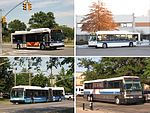
Routes Bronx (Bx-) • Brooklyn (B-) • Manhattan (M-) • Queens (Q-) • Staten Island (S-) • Nassau (N-) (ends December 31, 2011) • Express (x-, BM-, BxM-, QM-)Fleet Major hubs 165th Street Bus Terminal • Eltingville Transit Center • Hempstead Transit Center • St. George Ferry TerminalOther Fares • MetroCard • Manhattan and Bronx Surface Transit Operating Authority • Hudson Rail Link • Select Bus Service • New York City Bus garages • MTA Bus garages • Long Island Bus garages • Transportation in New York City • Mass transit in New York CityOfficial websites : New York City Bus/MTA Bus • Long Island BusCategories: -
Wikimedia Foundation. 2010.

